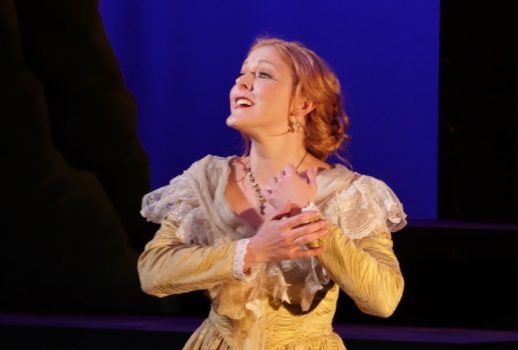
Dinorah is the “attractive… worthy… untiring” Jennifer Moore.
A return to Amore Opera’s production of Meyerbeer’s Dinorah to hear the second cast underlined two conclusions: first, that the woods of Brittany are absolutely full of top-notch coloratura sopranos running mad after pet goats, and second, less astonishingly, that Meyerbeer was a first-rate, elegant composer of opera, light as well as grand.
In his lifetime, of course, Meyerbeer had all the success a reasonable opera composer could desire. (Among his contemporaries, Verdi, too, was reasonable, triumphantly successful and rich; Wagner was never reasonable, on this or any other subject.)
Why, then, did Meyerbeer, once inescapable, the most popular composer at L’Opéra for most of a century, as commonplace then as Puccini is now, fall out of favor?
But first: Dinorah’s second cast. Jennifer Moore is as attractive a stage presence, as worthy an actress, as untiring a diva as was Holly Flack in the first cast. She lacks those insane beyond-high notes and has a less perfect trill—and she does not caper quite so vividly in time to the music she is singing, but the voice is a very beautiful one of impressive quality, a bit heartier in tone.
Moore’s ornamentation (and this era at the Opéra-Comique demanded constant ornamentation) pours out tirelessly in a lengthy evening. There are two performances of the opera on today and you are in for a treat with either lady.
Hoël, the faithless bridegroom who abandons Dinorah in hopes of supernatural gold, then regains our approbation by leaping into a gorge to rescue her, was sung by Nobuki Momma, a handsome stage figure with a pleasant ringing baritone.
And the comic bagpiper Corentin, whose foolish mutterings put some flesh on the bare bones of the story, was performed by Michael Celentano, with a thin but well-schooled tenor but excellent comic instincts. The minor pastoral characters (all double cast—how does Amore do it?) were also very well handled. Even Bellah the goat was played by different talented small children in cottonwool suits on the different nights.
The orchestra still falls down on the vivid Weber-esque rushing strings that open the overture, but thereafter, under the able hand of Richard Cordova, give us a very competent approximation of a worthy, delightful score, in no way deserving of its neglect.
Meyerbeer was justly renowned for inventive orchestral effects, and it’s no simple matter for a small-scale company to perform them: The hunter’s song in Act III, for example, calls for five French horns, and there they all are, playing in tune to boot.
The chorus appears rarely in Dinorah—there’s a religious procession during the overture, repeated at the evening’s end to draw the fable to a proper close, and the usual hunting song in Act II, and they provide a nice texture. But it’s the three stars and the orchestra who have the big numbers in a long and striking evening.
The pastorale is no longer a genre with which we are familiar—that accounts in large part for Dinorah’s obscurity. Even reduced as it has been here, and spoken in English, there is enough confused motivation in the story (she’s mad, of course she turns up and adds a third line to the trio for no obvious reason) to perplex the audience of 2019.
But if you love singing, and beautiful melody, there is much to delight in in Dinorah, the work of a consummate professional, presented by Opera Amore with impressive ambition and some extraordinary talent.
Photo via Facebook


